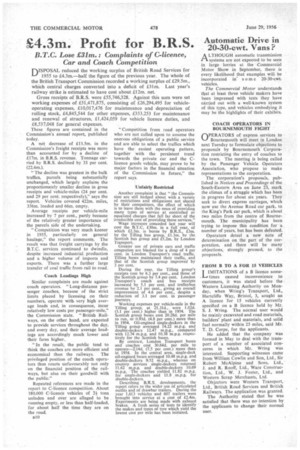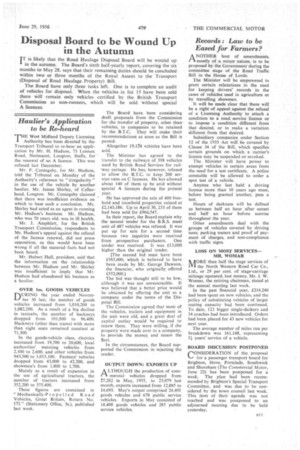Automatic Drive in 20-30-cwt. Vans ?
Page 44

Page 45

Page 46

If you've noticed an error in this article please click here to report it so we can fix it.
ALTHOUGH automatic transmission systems are not expected to be seen in large lorries at the Commercial Motor Show in September, there is every likelihood that examples will be incorporated in' some 20-30-cwt. vehicles.
The Commercial Motor understands that at least three vehicle makers have been impressed with tests they have carried out with a well-known system of this type, and vehicles embodying it may he the highlights of their exhibits.
COACH OPERATORS IN BOURNEMOUTH FIGHT riPERATORS of express services to Is-J Bournemouth will meet in London next Tuesday to formulate objections to proposals by Bournemouth Corporation restricting the entry of coaches to the town. The meeting is being called by the Passenger Vehicle Operators Association, who propose to make representations to the corporation.
The corporation's proposals, published in Notices and Proceedings of the South-Eastern Area on June 23, mark the climax of a struggle which has been in progress for about six years. They seek to divert express carriages, which now use the Avenue Road car park, to the King's Park car park, which is about two miles from the centre of Bournemouth. The municipality has been trying to impose this condition for a number of years, but has been defeated.
Operators detect a new note of determination on the part of the corporation, and there will be many objections, strongly pressed, to the proposals.
FROM B TO A FOR 15 VEHICLES IMITATIONS of a B licence some. LA times caused inconvenience to customers, it was stated before the Western Licensing Authority on Monday, when Wring's Transport, Ltd., Hartcliffe Way, Bristol, 3, sought an A licence for 15 vehicles currently specified on a B licence held by Mr.
S. J. Wring. The normal user would be mainly excavated and road materials, builders' plant and materials, and solid fuel normally within 25 miles, said Mr.
T. D. Corpe, for the applicants.
He added that the company was formed in May to deal with the transport of a number of associated concerns in which Mr. Wring was interested. Supporting witnesses came from William Cowlin and Son, Ltd., Sir Robert McAlpine and Sons, Ltd., • J. and R. Rooff, Ltd., Ware Construction, Ltd., W. J. Foster, Ltd., and Western Scrap Merchants, Ltd.
Objectors were Western Transport, Ltd., British Road Services and British Railways. The application was granted.
The Authority stated that he was satisfied that there was no intention by the applicants to change their normal user.
Haulier's Application to be Re-heard
THE West Midland Deputy Licensing Authority has been directed by the Transport Tribunal to re-hear an application by Mr. H. Hudson, 73 Lennox Road, Normacot, Longton, Staffs, for the renewal of an A licence. This was refused last December.
Mr. F. Coningsby, for Mr. Hudson, told the Tribunal on Monday of the Authority's reference to " irregularity " in the use of the vehicle by another haulier, Mr. James Shirley, of Cellarhead, Longton. Mr. Coningsby claimed that there was insufficient evidence on which to base such a conclusion. Mr. Shirley had acted as an agent in running Mr. Hudson's business. Mr. Hudson, who was 70 years old, was in ill health.
Mr. J. Amphlett, for the British Transport Commission, respondents to Mr. Hudson's appeal against the refusal of the licence renewal, did not press opposition, as this would have been wrong if all the material facts had not been heard.
Mr. Hubert Hull. president, said that the information on the relationship between Mr. Hudson and Mr. Shirley was insufficient to Imply that Mr. Hudson had abandoned his business as a haulier.
OVER lm. GOODS VEHICLES nURING the year ended November 30 last, the number of goods vehicles increased from 1,010,200 to 1,082,200. As a result of a big decline in taxicabs, the number of hackneys dropped from 101;300 to 96,400. Hackneys (other than trams) with more than eight seats remained constant at 71,300.
In the goods-vehicle class, electrics increased from 19,700 to 20.600, local authorities' watering vehicles from 2,100 to 2,600, and other vehicles from 943,500 to 1,015,100. Farmers' vehicles dropped from 43,000 to 42,200, and showmen's from 1,800 to 1,700.
Mainly as a result of expansion in the use of agricultural tractors, the number of tractors increased from 352,200 to 375,400.
These figures are contained in " Mechanically-P r ope I led Road Vehicles, Great Britain, Return No. 172" (Stationery Office, 3s.), published last week. OUTPUT DOWN: EXPORTS UP
ALTHOUGH the production of commercial vehicles dropped from 27,282 in May, 1955, to 25,079 last month, exports increased from 12.885 to 14,693. May's output comprised 24,401 goods vehicles and 678 public service vehicles. Exports in May consisted of 14,408 goods vehicles and 285 public service vehicles.
Records.: Law to be Eased for Farmers?
A NOTHER host of amendments, rAmostly of a minor nature, is to be proposed by the Government during the committee stage of the Road Traffic Bill in the House of Lords.
The Minister will be empowered to grant certain relaxations in the need for keeping drivers' records in the cases of vehicles used in agriculture or by travelling showmen.
It will be made clear that there will be a right of appeal against the refusal of a Licensing Authority to attach a condition to a road service licence or to impose a condition different from that desired, or to make a variation different from that desired.
Subsidiary companies under Section 12 of the 1933 Act will be covered by Clause 34 of the Bill, which specifies certain grounds on which a carrier's licence may be suspended or revoked.
The Minister will have power to exempt vehicles in certain areas from the need for a test certificate. A police constable will be allowed to order a spot test of a vehicle.
Anyone who last held a driving licence more than 10 years ago must, before being granted another, pass a test.
Hours of darkness will be defined as between half an hour after sunset and half an hour before sunrise throughout the year.
Other amendments deal with the groups of vehicles covered by driving tests; parking meters and proof of payment of charges, and non-compliance with traffic signs.
LOSS ON MOST SERVICES— MR. WOMAR ]4GRE than half the stage services of in the North Western Road Car Co., Ltd., or 29 per cent. of stage-carriage mileage operated, lost money, Mr. J. W. Womar, the retiring chairman, stated at the annual meeting last week.
In the past financial year, £214,240 had been spent on new vehicles, and the policy of substituting vehicles of larger seating capacity had been continued. To date. 122 bigger single-deckers and 34 coaches had been introduced. Orders had been placed for 43 new vehicles for next year.
The average number of miles run per breakdown was 161,148, representing 31 years' service of a vehicle.
BOARD DISCUSSION POSTPONED
CONSIDERATION of the proposal for a passenger transport board for Brighton, Hove, Portslade, Southwick and Shoreham (The Cominercial Motor, June 22) has been postponed for a week. The plan had been recommended by Brighton's Special Transport Committee, and was due to be considered by the town council last week. This item of their agenda was not reached and was postponed to an adjourned meeting due to be held yesterday.
COMPLAINT WITHOUT EVIDENCE
LOCAL authorities in Shropshire have been unable to produce evidence to support their complaint of public difficulty caused by a prohibition on picking-up between two points on the Wellington--Coalport service of the Birmingham and Midland Motor Omni'bus Co., Ltd.
When Wellington, Oakengates and Wenlock Councils complained that the public was being deprived of the service, the West Midland Licensing Authority gave notice of his intention to vary the condition. But at the resumed hearing in Birmingham last week, the three councils could not •produce suitable evidence and the notice was not pursued.
WANN LODGES APPEAL
AN appeal has been lodged by John Wann, haulier, Main Street, Methven, against the imposition of fines totalling £825 at Perth Sheriff Court (The Commercial Motor, June 15). Wann pleaded guilty to 447 offences relating to drivers' hours and breaches of licence conditions.
His agent stated that he regarded the matter as a test case on the application of cumulo fines. Mr. A. N. Prain, Sheriff-substitute, interpreted the law as meaning that there was no limit to the fines to which Wann was liable.
Special Meeting to • Discuss Merger
A SPECIAL meeting is to be held .1—k by Cleethorpes Town Council to consider the proposed amalgamation of their municipal bus undertaking with that of Grimsby. The transport committee are prepared to recommend the merger on the terms agreed to by representatives of both towns.
The council have deferred consideration of a committee resolution suggesting changes in the fares structure. The committee wish to shorten fare stages, to abolish workmen's tickets and to make children's fares half the adult rates.
Aid. G. R. Sinderson thought that if the proposals were put into effect some passengers would pay more but others would not.
GIRLING BRAKES TO BE MADE IN U.S.A.
GIRLING brakes are to be made_ under licence by the Fawick Corporation, Cleveland, Ohio, who have received an order from the Clark Equipment Co., a leading axle manufacturer, to supply 2,000 sets of brakes a month, rising to 10,000 sets a month.
Mr. Alex Fraser, vice-chairman and managing director of Girling. Ltd., who has paid several recent visits to America, said last week: "Prospects are exceedingly good of obtaining other orders from manufacturers in the truck field."
CHRISTMAS PAY PLAN REJECTED
THE National Joint Industrial Council for the road passenger transport industry have disapproved of Oldham Transport Committee's special basis, agreed in January last, for the payment of platform staff on Christmas Days which fall on a Sunday.
It had been decided to pay a minimum of seven hours at the ordinary rate, plus the ordinary rate for the number of hours worked if less than seven. Hours worked in excess of seven would be paid for at double time for the hours worked.
The Council have told the Committee that such payments would contravene the Conditions of Service Agreement.
















































































































































